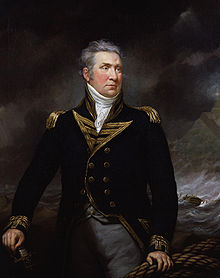Edward Pellew, 1st Viscount Exmouth
| Edward Pellew, 1st Viscount Exmouth | |
|---|---|

Edward Pellew, 1st Viscount Exmouth
|
|
| Born |
19 April 1757 Dover, England |
| Died | 23 January 1833 (aged 75) Teignmouth, Devon, England |
| Allegiance |
|
| Service/branch |
|
| Years of service | 1770–1820 |
| Rank | Admiral |
| Commands held |
East Indies Station Mediterranean Fleet Plymouth Command |
| Battles/wars |
American War of Independence French Revolutionary Wars Napoleonic Wars Second Barbary War |
| Awards | Knight Grand Cross of the Order of the Bath |
| Relations | Israel Pellew (brother) |
Admiral Edward Pellew, 1st Viscount Exmouth, GCB (19 April 1757 – 23 January 1833) was a British naval officer. He fought during the American War of Independence, the French Revolutionary Wars, and the Napoleonic Wars. His younger brother Israel Pellew also pursued a naval career.
Pellew was born at Dover, the second son of Samuel Pellew (1712–1764), commander of a Dover packet. The family was Cornish, descended from a family that came originally from Normandy, but had for many centuries been settled in the west of Cornwall. Edward's grandfather, Humphrey Pellew (1650–1721), a merchant and ship owner, son of a naval officer, resided at Flushing manor-house in the parish of Mylor. Part of the town of Flushing was built by Samuel Trefusis, MP for Penryn; the other part was built by Humphrey Pellew, who was buried there. He also had a property and a tobacco plantation in Maryland. Part of the town of Annapolis stands on what was, before the revolt of the colonies, the estate of the Pellews. On the death of Edward's father in 1764 the family removed to Penzance, and Pellew was educated for some years at Truro Grammar School. He was a pugnacious youth, which did not endear him to his headmaster. He ran away to sea at the age of 14, but soon deserted because of unfair treatment to another midshipman.
In 1770, Pellew entered the Royal Navy on board HMS Juno with Captain John Stott, and made a voyage to the Falkland Islands. In 1772, he followed Stott to the Alarm, and in her was in the Mediterranean for three years. In consequence of a high-spirited quarrel with his captain, he was put on shore at Marseilles where he found an old friend of his father's in command of a merchant ship. He was able to get a passage to Lisbon and so home. He afterwards was in the Blonde which took General John Burgoyne to America in the spring of 1776 under the command of Captain Philemon Pownoll. In October, Pellew and midshipman Brown were detached for service in the Carleton tender on Lake Champlain under Lieutenant Dacres. During the Battle of Valcour Island on 11 October, Dacres and Brown were both severely wounded, and the command devolved on Pellew. Pellew extricated the vessel from a position of great danger by his personal gallantry. As a reward for his service, he was immediately appointed to command the Carleton. In December, Lord Howe promised him a commission as lieutenant when he could reach New York, and in the following January Lord Sandwich wrote promising to promote him when he came to England. In the summer of 1777, Pellew and a small party of seamen were attached to the army under Burgoyne, and he was present in the fighting at Saratoga, where his youngest brother John was killed. He and the rest of the force were taken prisoner. After the surrender of Burgoyne at Saratoga, he was repatriated.
...
Wikipedia
